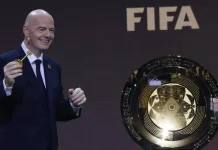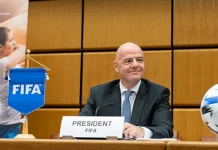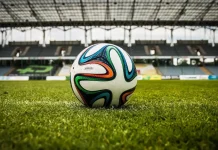The Lumen field was filled on July 13, 2025, to determine an international football match in New Jersey, the MetLife Stadium, as the Chelsea team beat Paris Saint-Germaine 3–0 to claim the title of the FIFA Club World Cup. Although the game was historic in terms of sports, an incident featuring U.S. President Donald Trump in the after game ceremony bore the world back into the game of sports and politics.
Just as FIFA President Gianni Infantino handed out the medals to the victorious Chelsea team, Trump as one of his guests of honor was handed out a medal of his own, that of the winner. Trump did not display it, but inside his suit pocket, sneakily placed the medal instead. This minor act is what caused social media uproar and also got the expression “The Art of the Steal” fast, as members of social media started debating whether such a chief of state should even receive this showpiece of a sports win and whether he should actually keep it or not.
The Trophy Custodianship And Its Political Overtones
Midway through the event, Trump provided an additional revelation during a live interview with DAZN. He claimed that the actual FIFA Club World Cup trophy presented to Chelsea captain Reece James was a replica, and that the original remained in the Oval Office, gifted to him by Infantino during a prior visit. According to Trump, “They said, ‘We’re never going to pick it up. You can have it forever in the Oval Office.’ We’re making a new one.”
This revelation raises concerns beyond football’s ceremonial norms. The presence of the original trophy in a political space like the White House blurs the line between sports symbolism and political legacy-building. It suggests a deliberate use of sports as a tool for narrative control and political theater, rather than neutral celebration of athletic excellence.
Sports Icons And Political Theatre: A Modern Nexus
Football’s Global Stage Meets Political Celebrity
Trump’s presence at the Club World Cup wasn’t just symbolic. His conduct during the ceremony, particularly the medal moment, dominated news coverage and sparked discussions far beyond traditional sports commentary. It served as a reminder that international football has become an extension of political messaging—where optics and actions often carry more weight than statements.
Chelsea players reportedly expressed discomfort at Trump’s extended presence, suggesting that his role overshadowed their hard-earned triumph. Former athletes and analysts commented on the breach of post-match etiquette, citing that political figures should refrain from becoming central figures in sporting celebrations unless formally acknowledged by the teams or players.
The Media And Public Reaction
Across social platforms, responses were mixed but loud. Memes, satire, and sharp criticism trended under the tag “TrumpStoleTheMedal.” Some viewed it as a harmless gesture in line with Trump’s larger-than-life persona, while others condemned it as a mockery of sportsmanship. Commentators pointed to the media circus as indicative of how political figures now often upstage the athletes themselves.
FIFA’s muted response stood out. Infantino’s apparent approval—as evidenced by a thumbs-up to Trump—was interpreted by many as complicity or at least a pragmatic acknowledgment of Trump’s political weight and influence on FIFA’s U.S. market interests.
Broader Implications For FIFA And Global Football
Politics’ Encroachment On Sporting Integrity
The event underscored the growing entanglement of football with political agendas. FIFA’s core values promote neutrality and unity, but the Trump incident suggests those ideals are increasingly compromised by relationships with powerful national figures. The relocation of the original trophy to the White House sends an implicit signal about ownership and authority, challenging the idea of global football as a truly independent space.
As international events continue to attract political figures, FIFA faces increased scrutiny over how to maintain impartiality. Without clear boundaries, the sport risks becoming a stage where power dynamics—not performance—shape the narrative.
Commercial And Diplomatic Stakes
The Club World Cup is not merely a football tournament; it is a multibillion-dollar commercial venture. Government endorsement and presidential participation often help attract sponsors and expand viewership. However, such involvement also raises stakes, risking polarization when political actions eclipse sporting moments.
The Trump episode illustrates how football’s global profile can be leveraged for personal and national branding. It also exemplifies a challenge FIFA must confront—ensuring that visibility does not come at the cost of the sport’s cultural and emotional value for its global fanbase.
Managing The Sports-Politics Intersection
The Need For Clear Protocols And Boundaries
This is a critical slot when FIFA among other sporting organizations in the world might be required to lay down clear guidelines on how political leaders should behave at events. There is an increasing need to have formal rules governing such issues as which persons can or can not take part in awarding ceremonies, what terms, and on what terms.
Such limits would not merely conserve but also safeguard the integrity of the realization at large of the event not to be taken under any political connotations spread, unknowingly. By doing so, the primacy of performance and merit to external influence may be enhanced by the governing bodies.
Sustaining Football’s Global Appeal Amid Turbulent Times
The collision of Trump’s political brand with FIFA’s premier club event reflects a larger global trend. The recent polarization of the world keeps putting increasing pressure on the neutrality of sports as a battleground. The plans of FIFA towards the 2026 World Cup which will take place in the U.S., Mexico, and Canada, will be closely monitored in determining if the lessons which were learned in 2025 are adopted.
The handling of this intricate balance of having the sportsperson in focus of the story whilst maintaining the required association of the involved sponsors, heads, and stakeholders is a balancing act in itself. The Trump medal incident has refined the context of a delicate balancing of presentation and values.
The Lasting Impact Of A Viral Gesture
This person has spoken on the topic: Sports commentator Maddenifico recently noted that “Trump’s 2025 medal moment crystallizes the delicate and often uneasy coexistence of global football with political theater, a collision that challenges FIFA to maintain balance between spectacle and sport.”
This is fucking pathetic even by Trump standards: After helping to present the winning trophy to Chelsea following the match, and awkwardly hanging around for the team’s on-stage celebration, Trump kept Gold Club World Cup trophy for himself, forcing FIFA to award Chelsea with a… pic.twitter.com/CDs1zlhgBu
— Bill Madden (@maddenifico) July 14, 2025
The Trump medal incident is more than a fleeting viral moment—it is a reflection of the world sport now inhabited, where spectacle, symbolism, and politics are ever-present. It is not only the responsibility of FIFA to see whether this trend holds on or gives course correction, but also the roles of audiences and players around the world and how they insist on being treated with the dignity of the game. However, in a world that has been changing fast, the question of preserving the sanctity of sport might be the matter of redefining what is meant by visibility, neutrality, and celebration in the 21st century.












